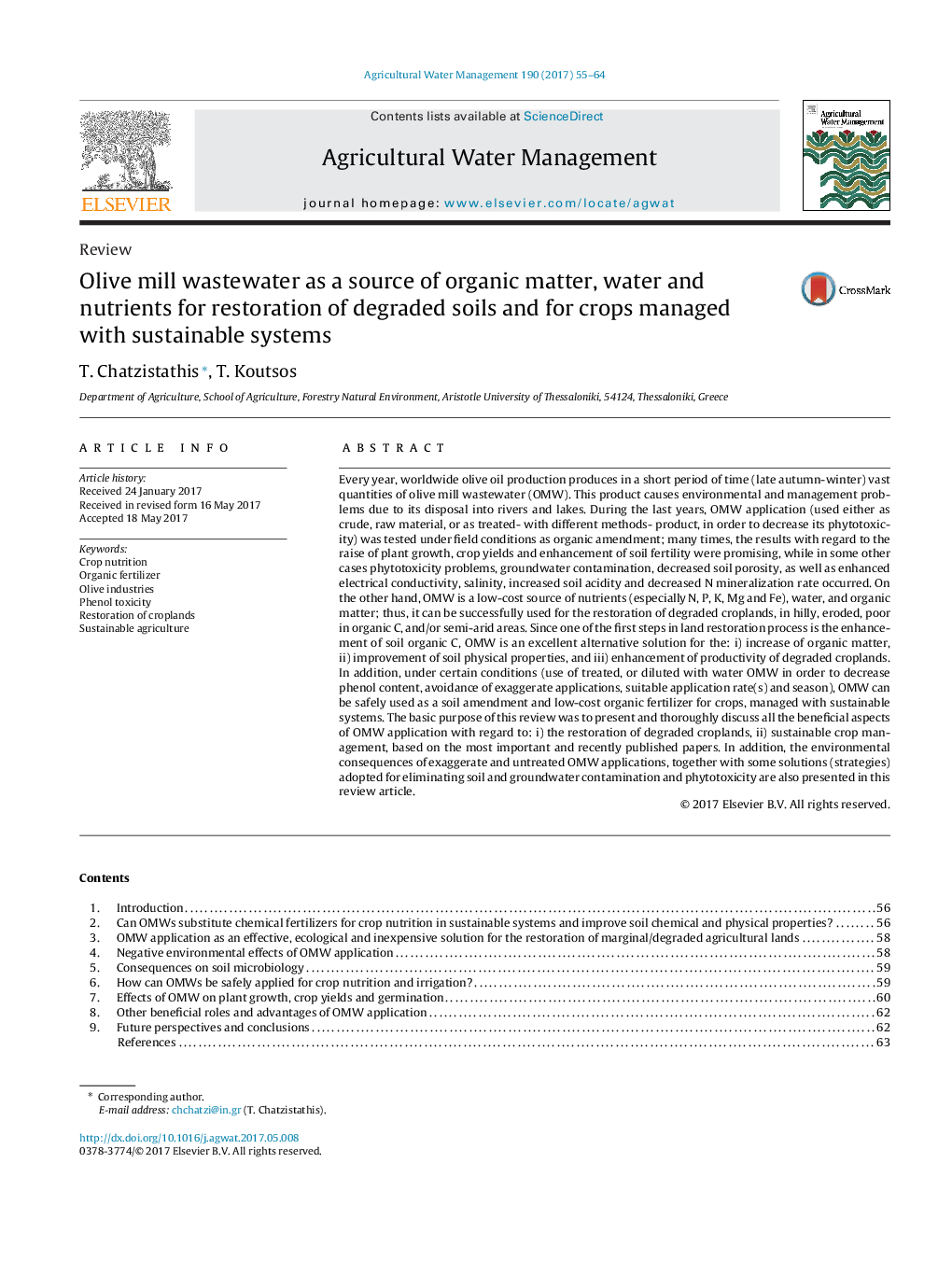| کد مقاله | کد نشریه | سال انتشار | مقاله انگلیسی | نسخه تمام متن |
|---|---|---|---|---|
| 5758317 | 1622890 | 2017 | 10 صفحه PDF | دانلود رایگان |
عنوان انگلیسی مقاله ISI
Olive mill wastewater as a source of organic matter, water and nutrients for restoration of degraded soils and for crops managed with sustainable systems
ترجمه فارسی عنوان
فاضلاب زیتون به عنوان منبع مواد آلی، آب و مواد مغذی برای بازسازی خاک های تخریب شده و برای محصولات تحت مدیریت سیستم های پایدار
دانلود مقاله + سفارش ترجمه
دانلود مقاله ISI انگلیسی
رایگان برای ایرانیان
کلمات کلیدی
تغذیه محصول، کود آلی، صنایع زیتون، سمیت فنل، ترمیم گیاهان، کشاورزی پایدار،
موضوعات مرتبط
علوم زیستی و بیوفناوری
علوم کشاورزی و بیولوژیک
علوم زراعت و اصلاح نباتات
چکیده انگلیسی
Every year, worldwide olive oil production produces in a short period of time (late autumn-winter) vast quantities of olive mill wastewater (OMW). This product causes environmental and management problems due to its disposal into rivers and lakes. During the last years, OMW application (used either as crude, raw material, or as treated- with different methods- product, in order to decrease its phytotoxicity) was tested under field conditions as organic amendment; many times, the results with regard to the raise of plant growth, crop yields and enhancement of soil fertility were promising, while in some other cases phytotoxicity problems, groundwater contamination, decreased soil porosity, as well as enhanced electrical conductivity, salinity, increased soil acidity and decreased N mineralization rate occurred. On the other hand, OMW is a low-cost source of nutrients (especiallyâN, P, K, Mg and Fe), water, and organic matter; thus, it can be successfully used for the restoration of degraded croplands, in hilly, eroded, poor in organic C, and/or semi-arid areas. Since one of the first steps in land restoration process is the enhancement of soil organic C, OMW is an excellent alternative solution for the: i) increase of organic matter, ii) improvement of soil physical properties, and iii) enhancement of productivity of degraded croplands. In addition, under certain conditions (use of treated, or diluted with water OMW in order to decrease phenol content, avoidance of exaggerate applications, suitable application rate(s) and season), OMW can be safely used as a soil amendment and low-cost organic fertilizer for crops, managed with sustainable systems. The basic purpose of this review was to present and thoroughly discuss all the beneficial aspects of OMW application with regard to: i) the restoration of degraded croplands, ii) sustainable crop management, based on the most important and recently published papers. In addition, the environmental consequences of exaggerate and untreated OMW applications, together with some solutions (strategies) adopted for eliminating soil and groundwater contamination and phytotoxicity are also presented in this review article.
ناشر
Database: Elsevier - ScienceDirect (ساینس دایرکت)
Journal: Agricultural Water Management - Volume 190, August 2017, Pages 55-64
Journal: Agricultural Water Management - Volume 190, August 2017, Pages 55-64
نویسندگان
T. Chatzistathis, T. Koutsos,
